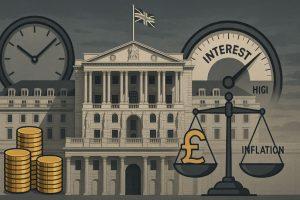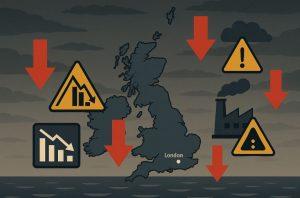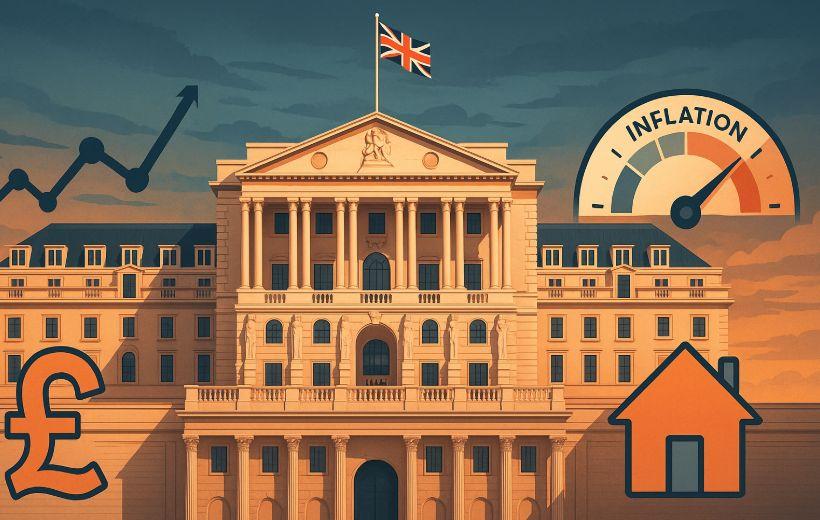The question “Will the Bank of England cut interest rates in 2025?” is more than financial speculation. it’s a crucial issue influencing household budgets, business decisions, mortgage planning, and overall economic stability across the UK.
In London especially, where the cost of living and home ownership weighs heavily, interest rate policy isn’t abstract. It’s personal.
With inflation showing signs of easing and economic growth remaining stagnant, the monetary conversation is shifting. Investors, analysts, and everyday citizens alike are now asking whether the Bank of England will respond with a much-anticipated interest rate cut.
In this detailed analysis, we explore predictions from top financial experts, examine the UK’s economic conditions, and break down what a rate cut could mean for your money in 2025.
What Is the Current Status of the Bank of England’s Interest Rates?

The Bank of England’s base interest rate stands at 5.25% as of August 2025. This level has remained unchanged since mid-2023, marking the end of a 14-consecutive-hike streak that began in December 2021 to combat surging inflation.
Rates were increased in response to the post-pandemic inflation surge, supply chain disruptions, Brexit-related economic pressures, and soaring energy costs due to the Ukraine conflict. UK inflation peaked at over 11% in late 2022.
The high rate strategy has largely worked. Inflation has since fallen significantly, but the BoE has been cautious about reversing course too soon.
Why Are Experts Predicting a Potential Interest Rate Cut in 2025?
Top economists and financial institutions, including Morgan Stanley, ING, and Lloyds Bank, are forecasting a rate cut between Q3 and Q4 2025, depending on inflation and economic activity.
Market Sentiment Is Shifting
According to data from the Chicago Mercantile Exchange’s BoE Watch Tool, traders have begun pricing in a 25–50 basis point cut before the end of 2025. The markets are increasingly expecting easing, especially if inflation continues to drop below 3%.
Rising Political Pressure
With a general election likely in 2026, government officials are reportedly concerned about the political fallout of prolonged high borrowing costs especially in areas like London where the housing market remains overheated. This may increase pressure on the BoE to lower rates sooner.
How Does UK Inflation Influence the BoE’s Decisions?
CPI and Core Inflation Trends
The Consumer Price Index (CPI) fell to 2.8% in July 2025, a significant improvement from the double-digit highs of 2022. Core inflation (which excludes volatile energy and food prices) stands at 3.1%, still above target but trending downward.
Inflation Targeting Strategy
The BoE’s core mandate is to maintain 2% inflation. While progress has been made, officials are wary of cutting rates too soon and reigniting price pressures particularly in wage-driven service sectors.
What Economic Indicators Are the Bank of England Watching?
Beyond inflation, the BoE examines a broad basket of economic data before making decisions. Here’s how those indicators currently look:
| Economic Indicator | Current (2025) Status | BoE Interpretation |
| GDP Growth | ~0.3% annualised | Weak economic momentum |
| Unemployment Rate | 4.6% | Slight uptick, job market softening |
| Wage Growth | 5.1% | Still high, poses inflationary risk |
| Consumer Confidence | -27 index points (GfK) | Low, indicates cautious spending |
| Business Investment | Down 2.3% YoY | Reflects uncertainty and tight credit |
The Productivity Puzzle
UK productivity has failed to improve significantly post-pandemic, limiting the economy’s ability to grow without stoking inflation. This has complicated the BoE’s monetary decisions.
Could the UK Enter a Recession in 2025?

Recession Risks Remain Real
Although the UK has narrowly avoided a technical recession in the past two quarters, the risk remains. Economists at the National Institute of Economic and Social Research (NIESR) forecast a 60% chance of a mild recession before mid-2026.
London’s Economy in Focus
As the financial and housing hub of the UK, London is particularly exposed to interest rate changes. A prolonged period of high rates has slowed investment in property development and technology startups key pillars of the city’s economy.
How Might a Rate Cut Affect Mortgages, Savings, and Borrowing?
Mortgages Could See Relief
Homeowners on tracker and variable-rate mortgages would benefit immediately from a rate cut. For instance, a 0.5% cut could save the average London homeowner £60–£90 per month on a £300,000 mortgage.
Fixed-Rate Borrowers Still Locked In
Those who fixed their mortgages during the peak of rate hikes may not benefit immediately. However, a lower rate environment will open more affordable remortgaging opportunities in 2026.
Savers May Lose Out
Savings rates will likely fall. Banks may cut returns on ISAs and fixed-rate bonds, making it harder for savers particularly retirees to grow capital without taking risks.
What Have BoE Officials Said About Future Rate Moves?
Public Comments from the MPC
Governor Andrew Bailey has repeatedly emphasised the need for “data-dependent” policy. In July 2025, he said:
“We’ve made substantial progress on inflation, but it’s premature to declare victory. Rate reductions are possible, but only with sustained improvements.”
Internal Divisions
Recent BoE meeting minutes reveal a split among committee members, with some pushing for immediate cuts while others advocate for continued restraint. This divergence signals uncertainty and highlights how close the UK is to a potential turning point.
How Are Financial Markets Reacting to Interest Rate Speculations?

Sterling, Bonds, and Stocks
- GBP has shown mild weakness in anticipation of future rate cuts.
- 10-year gilt yields have fallen to 3.7%, down from 4.5% a year ago, as investors bet on easing.
- The FTSE 100 has rallied on expectations of lower borrowing costs for businesses.
Investor Sentiment
According to Bloomberg, institutional investors have reallocated assets towards UK equities and commercial property in anticipation of cheaper credit in 2026.
What Are the Possible Scenarios for the UK Base Rate in 2025?
| Scenario | Rate Path | Inflation Outcome | Economic Risk | Likelihood (%) |
| Soft Landing | Gradual cuts to ~4.5% | Inflation stays near 2% | Limited growth recovery | 50% |
| No Change | Holds at 5.25% | Inflation remains sticky | Weak consumer demand | 30% |
| Aggressive Cuts | Below 4% by Q4 2025 | Rapid inflation fall | Risk of housing bubble | 20% |
How Do Global Trends Influence BoE Interest Rate Policy?
Fed and ECB Policies
Both the Federal Reserve and the European Central Bank have signalled readiness to cut rates in late 2025. If they do, pressure will mount on the BoE to avoid an overly strong pound and maintain export competitiveness.
Global Inflation and Oil Prices
The ongoing conflict in the Middle East and trade tensions with China could spike commodity prices. The BoE must stay responsive to global risks that could reverse domestic progress on inflation.
Should Consumers and Businesses Prepare for Lower Rates?

Strategic Planning for Individuals
- Homeowners should review remortgaging options in advance.
- Savers may consider locking in rates on fixed products before any BoE cut.
- First-time buyers could benefit from a more affordable market later in 2025.
Actions for Small Businesses
- Review debt obligations and refinance if possible.
- Prepare to increase investment in Q1 2026 when credit may become cheaper.
- Monitor BoE communications closely to adjust forecasting models.
What Role Do UK House Prices Play in Interest Rate Decisions?
London’s Housing Market Pressure
The Bank of England closely monitors house price inflation, especially in overheated markets like London. A sustained period of high interest rates has already cooled the property market, with average house prices in the capital dropping by 3.5% year-on-year as of Q3 2025.
While lower interest rates typically stimulate demand by making borrowing cheaper, the BoE must avoid over-inflating an already stretched housing sector. Balancing affordability with financial stability is a key consideration in future rate movements.
Are Falling Prices a Concern?
In regions outside London, house price drops have been sharper up to 5% in the North East and parts of Wales. The BoE may see this as a correction rather than a crisis. However, sharp declines could undermine household wealth and dampen consumer confidence, especially among new buyers with high loan-to-value mortgages.
Could Digital Currencies or Fintech Influence BoE Rate Strategy?
Central Bank Digital Currency (CBDC) Developments
The Bank of England has been exploring the launch of a UK digital pound, often referred to as “Britcoin”, which could fundamentally reshape monetary policy tools. Although still in development, the move toward CBDCs signals the BoE’s desire to maintain control in an increasingly digitised financial system.
Fintech’s Growing Role in Lending
London’s fintech sector, home to firms like Revolut, Monzo, and Starling Bank, is offering alternative credit products and savings platforms that operate independently of traditional rate structures. While still relatively small in market share, their growth may force the BoE to consider broader economic dynamics beyond traditional bank lending when setting the base rat
What Exactly Is the Bank of England Base Rate?
The Bank of England base rate, also known as the official bank rate, is the interest rate the BoE charges commercial banks for overnight loans. It’s the single most important monetary policy tool the Bank uses to control inflation and influence economic activity.
Changes to this rate ripple across the entire financial system. It directly impacts:
- Mortgage interest rates
- Savings account returns
- Credit card and loan interest
- Currency exchange rates
- Business borrowing costs
When the base rate rises, borrowing becomes more expensive and saving becomes more attractive — helping to cool inflation. When the rate falls, the opposite occurs, stimulating borrowing and investment.
A Historical Perspective on the Base Rate
Historically, the base rate has seen wide fluctuations. For example:
| Year | Base Rate (%) |
|---|---|
| 2007 | 5.75% |
| 2009 | 0.50% |
| 2021 | 0.10% |
| 2023 | 5.25% |
| 2025 | 5.25% |
The BoE slashed rates following the 2008 financial crisis, maintained ultra-low levels through the COVID-19 pandemic, and then raised rates sharply from 2021 to 2023 in response to rising inflation.
Why It Matters to Londoners and UK Businesses?
In London, where high property values and credit exposure are common, even small changes to the base rate can significantly affect affordability. For example:
- A 0.5% rise in the base rate could add £80–£120/month to an average variable mortgage.
- Businesses dependent on credit lines or financing will see immediate cost adjustments tied to this benchmark.
Understanding the base rate isn’t just for economists. it’s essential knowledge for anyone managing a home, a business, or investments in today’s UK economy.
Conclusion
The Bank of England is watching the right indicators, and while it remains cautious, the path to easing seems imminent. For businesses, homeowners, and savers across London and the UK, this shift could reshape financial decisions in the months to come.
The base rate may not plummet, but even a modest cut could ease pressure on households and fuel growth. Ultimately, 2025 is shaping up to be a year of transition, and staying informed will be the best financial strategy for all.
FAQs
What does the Bank of England base rate affect?
The base rate impacts borrowing and savings costs, including mortgages, loans, credit cards, and deposit interest rates.
When will the next BoE rate review take place?
The next MPC meeting is scheduled for September 18, 2025.
Will a rate cut make London housing more affordable?
It may ease monthly payments, but house prices depend on broader supply and demand dynamics.
How does the BoE coordinate with the UK government?
The BoE operates independently, but its policies significantly impact fiscal planning and public borrowing costs.
Are interest rates in the EU and US falling too?
Yes, both the ECB and Fed are expected to begin cutting rates in late 2025, following similar inflation trends.
Can rate cuts solve economic stagnation?
Not alone structural reforms, government spending, and global stability are also required to sustain growth.
Should I fix my mortgage now or wait?
It depends on your risk appetite. If rates fall, waiting could help, but locking in offers certainty in uncertain times.









Leave feedback about this